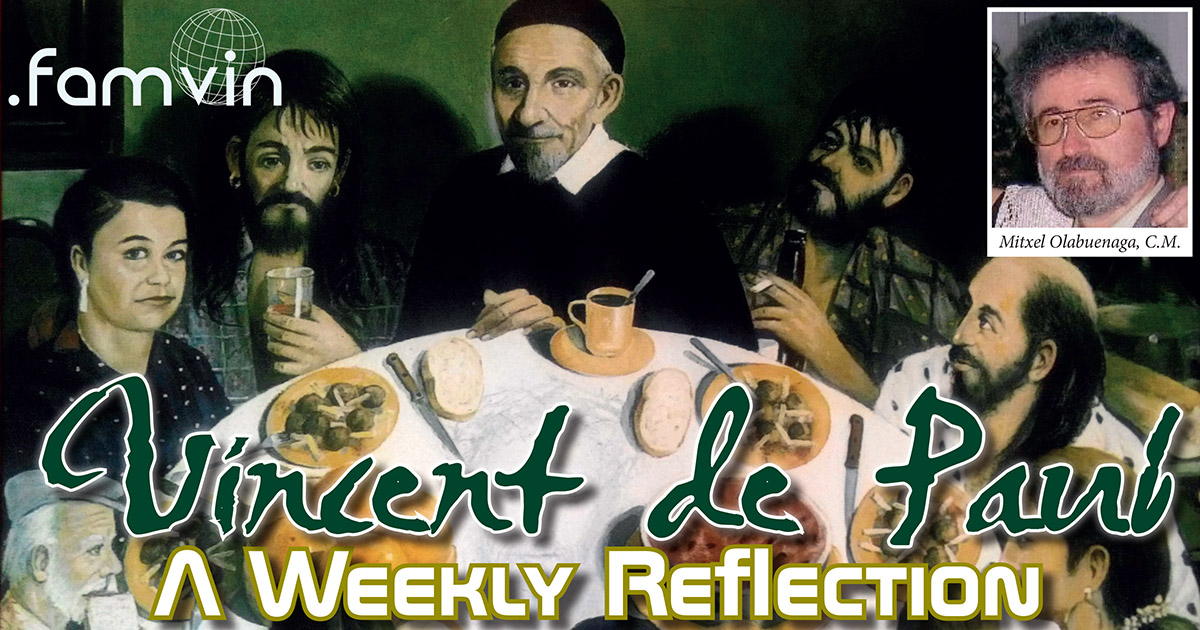“On the day of the conversion of St. Paul, who is the 25th, this lady asked me —said Father Vincent— “to have a sermon in the church of Folleville to exhort its inhabitants to the general confession. So I did. I preached them on its importance and usefulness, and then I taught them how to do it properly. And God had so much appreciation of the confidence and good faith of that lady (for the great number and enormity of my sins would had prevented the fruit of that action), that He blessed my words and all those people were so touched by God that they went to make their general confession. […] So was the first sermon of the Mission and the success God gave to it on the day of the conversion of Saint Paul: God did it.” (Abelly, I:60-61; CCD:XI:2-4.)
Vincent de Paul
Reflection:
- What Vincent tells in this text occurs in a small French town: Folleville. It will be a matter that, as we see, will occupy us Vincentians during the year 2017, the four hundred anniversary.
- Great is the providential dependence that Mr. Vincent has on the God of Jesus Christ. Having said that, we will have to agree that this providentialism unfolds through people of flesh and blood. In this case, the “messenger” is none other than Marguerite de Silly, wife of Mr. Gondi and protector of Mr. Vincent’s initiatives. And she is there, as it is said, from the first moment. More even: she is the promoter of the idea. We would say that the first intuition was Marguerite’s. Mr. Vincent, one of several clerics in his service, is nothing but the obedient servant of the one who pays him.
- We know — I will not stop on this— the reason that Mrs. De Gondi has to ask of Mr. Vincent a “good” sermon”: to exhort its inhabitants to the general confession. What was common (and extended for centuries) was a sermon of “conviction,” that is, a speech that reached the heart. And here arises the formation of Mr. Vincent. Because, despite his always-used derogatory expressions of his capacities, Mr. Vincent was an excellently trained person compared with what was usual in his time. The scheme used for the sermon is worthy of the most modern pedagogical schools today: importance of the subject, usefulness of the same and procedure to achieve it.
- “That was the first sermon of the Mission.” If Mr. Vincent says it, it will be so. We must, however, qualify the expression because it is affirmed years later, when the “work” was already settled. In other words, we are faced with the charismatic or interpretive Vincent who does not hesitate to convince the audience, not only to proclaim himself incapacitated for the work (“number and enormity of my sins”), but to put the success of the enterprise in God’s hands (“God did this …”). This excellent resource (Vincent himself) derived not only from faith but also from the very intelligence of Mr. Vincent. Simplicity? Yes; but, with the same intensity, wiliness!
- From the historic to the charismatic Vincent. It is quite possible that the study and reflection on Mr. Vincent, or on Saint Vincent, is exhausted. So one of his best connoisseurs affirms, who, without defining it, has given one of the interpretative keys of his personality when he titled his biography a “Mr. Vincent to Saint Vincent.” And it is not, I think, a matter of studying two realities (think the reader in the obsolete debate between the historical Jesus and the Christ of faith), but to affirm that, in order to reach the Vincentian essence, we must start with the historical Vincent if we want to reach the charismatic Vincent.
Questions for dialogue:
- What is your knowledge of the historical Vincent?
- Do we apply in our reflections or sermons the method of St. Vincent?
- Are we open to God’s mediations in our works and ministries?
- Are we attentive to the human voices that speak to us from God and history?
Mitxel Olabuenaga, C.M.








Thanks for enlightening us about our Patron Saint, Vincent De Paul. We pray that all Vincentians will faithfully follow his spirituality and charism.
Greetings from Gaborone, Botswana to you all.